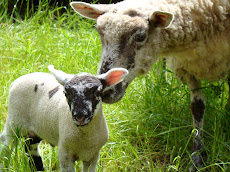American Blackbellies are a hair sheep, which means they shed - no sheering. According to information online, they are suppose to be very disease resistant. They twin and sometimes have triplets. And the icing was that you don't have to trim their hooves. The one downside reported was that American Blackbellies are "a little skittish".
We purchased two American Blackbellies from a farm in Oregon. When we got them home, they wouldn't come near us, not even when enticed by oats. For days we tried to help them get acclimated, but they kept a minimum 15 foot distance at all times. Then the older ewe gave birth to triplets, in the pouring rain. That is a whole different story, which is posted as well, but the bottom line is that it took Jeremy, Jordan and our neighbor Lola (I wasn't home) nearly half the day to get the two ewes and two lambs (one lamb was still born) to the barn. And as a result of spending so much time in the cold rain, one of the lambs died. It was awful.
New moms and lambs have to stay in the barn for a week or more before being put on the pasture. And there are things to do with the lamb to make sure it is healthy and getting enough food. Every time I went into the stall to do anything with the lamb, the mother would panic and bolt. Twice she knocked her baby over. Once she nearly jumped the gate. To get them onto the pasture, Jeremy had to catch the mom mid-jump while I tackled the lamb and carry them out of the barn. "A little skittish" huh?!
When we decided to purchase a ram we knew that American Blackbelly would not be the breed. We opted for a mutt with mixed breeds including Suffolk, Tunis and Katahdin. We ended up buying twin brothers - one for breeding and one for eating. The very first afternoon, both came right up and let us pet their noses. They came running for oats. They let us administer medicine without a huge fight. Wow, so much better! We did have to sheer them, but it was no problem because they loved the attention. (In the end, we kept Junior and ate Buddy.)
American Blackbellies, as we experienced, are not disease resistant. We lost two to some unknown disease. After ruling out the usual parasites and other sheep ailments, it would have cost more than $100 to figure out what was wrong. We decided to save our money and buy a different breed.
Next we got Notag and Lilly. Both are mixed breeds with some Suffolk. Notag is amazingly sweet. The only animals on the farm nicer are the cats. And while Lilly doesn't like quite as much pets and loves as Notag, Lilly isn't skittish and pretty easy to work with. Notag shocked us last fall when she got hit by a porccipine and let me remove 30 quills without making a fuss at all. It was a huge relief to work with such friendly animals. And I happy to report that the last two half-breed American Blackbellies, which are almost as skittish as their great grandmas, will be butchered this spring and we'll be done with that breed.

This past weekend, the sun came out and the temperatures went up above 80 F, so Jeremy decided to sheer Notag. We do this by hand, not with a big electric contraption. Notag stood for more than an hour, slowly rotating around, while Jeremy trimmed. Twice I went by the barn and distracted her - she thought I might give her some oats. But as soon as I went to the garden, Notag walked right back over to Jeremy to continue the hair cut. Junior also got a hair cut, but it took a few sessions. We probably should have done Lilly yesterday as well, but we ran out of time and steam. Lilly will have to wait until next weekend. The temperatures are suppose to go back down to the lower 70's, so she won't be too hot. We do need to get to her soon though. Both Notag and Lilly are pregnant. Having less wool will make birthing easier and allow the lambs to find the teats.
So my unsolicited advise to anyone just getting into raising farm animals. Purchase the best temperament goats, sheep, chickens, pigs, you can find. You won't ever regret having animals that are easy to work with.








.jpeg)




2 comments:
I think that's some very good advice! If we ever get our fences done and get sheep the first breed we are going to get is a friendly one (Shetland). Trying to get over the learning curve on a animal you've never had before seems much harder if it's scared witless by you.
Also Suffolk and Tunis - good breeds. But I think the most important thing is to just work with them from lambs to adults. And give them lots of treats - they look at you and think "oats!"
Post a Comment